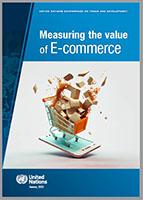
Producing statistics on the digital economy and society is an increasingly important component of the work programme of national statistical organizations. The demand for such statistics continuously rises as more countries seek to design, monitor and review national policies and strategies to take advantage of information and communications technologies (ICTs).
Business communities also require information about the access to and use of ICTs by various consumer groups, as well as their impact. This is a particular challenge for developing countries, many of which are still at an early stage of measuring various aspects of our increasingly digital economies and societies.
At the international level, comparable indicators are critical for cross-country comparisons, monitoring of the digital divide and establishing policy-relevant benchmarks.
One area in which there is very limited information available concerns the monetary value of e-commerce transactions. Measuring this has become increasingly important, not least as a result of the COVID-19 pandemic during which a shift to making online purchases supported economic resilience.
Better statistics on the value of e-commerce are needed to understand its economic role and contributions to GDP, employment and development, as well as for evidence-based policymaking. Because of this, UNCTAD member states have indicated that developing guidance and support on measuring e-commerce is a key priority.
This report provides a foundation for the next step in efforts to measure e-commerce. Its analysis will serve as a basis for the work of a task group of delegates from interested countries and international organizations with the view of developing statistical guidelines for measuring the value of e-commerce sales and purchases.
The task group will inform deliberations of the UNCTAD Working Group on Measuring E-commerce and the Digital Economy.
